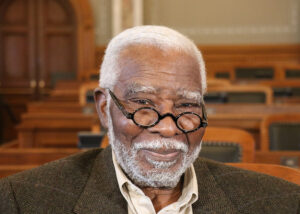Diverse Voices in Public Policy
About this Collection
Diverse Voices in Public Policy contains interviews with former legislators, cabinet officials, or other prominent policymakers. The collection is significant because interviewers have explored a range of issues including race, ethnicity, gender, and sexual orientation. These interviews show how the composition of the legislature and state government changed with respect to diversity, and what challenges existed for persons of color and other minority groups.

Interview of Eugene Anderson, April 21, 2022
Interviewed by Frances Jackson
Senator Eugene Anderson's oral history interview covers his 20-year career in Kansas politics, serving in both the Kansas House and Senate and later, in the administration of Governor Joan Finney. In addition, Anderson has been a Wichita business man and author. Anderson described growing up in Georgia and the values he learned in his segregated community - work hard, never quit, build relationships and make your community better. His priority issue when he went to the legislature was making the schools better. Anderson described his friendship with Governor Joan Finney, going back to when she was Show MoreState Treasurer and how he asked her not to invest in the apartheid government in South Africa. Later, she appointed him Director of Aviation and he was able to work with other state directors to support the Kansas aviation industry on product liability legislation. Throughout the interview Anderson revealed his philosophy of effective governance. Show Less

Interview of Carolyn Campbell, March 25, 2022
Interviewed by Eric. Sexton
"Mrs. Campbell", as Carolyn Campbell is known around the Statehouse, has experienced an important part of state history in Kansas government. Following her 1991 retirement from Southwestern Bell, she worked for countless numbers of legislators; then used that experience, to become an elected official in her own right -- serving on both local and state school boards. Campbell was the first African American to serve on the Kansas Board of Education. Campbell started her oral history interview with this: "I am a proud product of segregation. I tell that because folks sometimes think, “Oh, that’s Show Moretoo bad,” but I want everybody to know that as a black child in Topeka with the four all-black elementary schools that we had, we got excellent education, and we were told that we could be whatever we wanted to be, and we were valued every day. " This interview covers her experiences as a 12-year member of the Topeka Public Schools Board of Education, and later her eight years on the State Board of Education.
Highlights -- short excerpts from the interview











